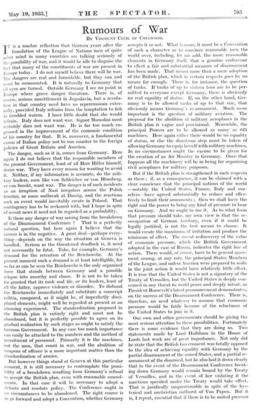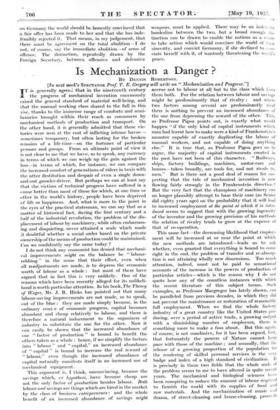Rumours of War BY VISCOUNT CECIL or CIIELIN 0013.
IT is a sombre reflection that thirteen years after the foundation of the League of Nations men of quite sober mind in many countries are talking seriously of the possibility of war, and it would be idle to disguise the fact that many of the constituents of war are present in Europe today. I do not myself believe there will be war. The dangers are real and formidable, but they can and must be surmounted. It is naturally to Germany that all eyes are turned. Outside Germany I see no point in Europe where grave danger threatens. There is, of course, serious unsettlement in Jugoslavia, but a revolu- tion in that country need have no repercussions exter- nally, provided Italy refrains from the temptation to fish in troubled waters. I have little doubt that she would refrain. Italy does not want war. Signor Mussolini most certainly does not want war. He is far too much en- grossed in the improvement of the economic condition of his country for that. It is, moreover, a fundamental canon of Italian policy not to run counter to the foreign policies of Great Britain and America.
The danger, such as it is, comes from Germany. Here again I do not believe that the responsible members of the present Government, least of all Herr Hitler himself, desire war. They have every reason for wanting to avoid it. Neither, if my information is accurate, do the mili- tary leaders, men like von Schleicher or von Blomberg, or von Seeckt, want war. The danger is of such incidents as an irruption of Nazi irregulars across the Polish frontier, or some outbreak at Danzig, and the reactions such an event would inevitably create in Poland. That contingency has to be reckoned with, but I hope in spite of recent news it need not be regarded as a probability.
Is there any danger of war arising from the breakdown of the Disarmament Conference ? That is a perfectly natural question, but here again I believe that the answer is in the negative. A great deal—perhaps every- thing—depends on the way the situation at Geneva is handled. Serious as the threatened deadlock is, it need not necessarily be fatal. Take, for example, Germany's demand for. the retention of the Reichswehr. At the present moment such a demand is at least intelligible,-for so far as can be seen the Reichswehr is the only organized force that stands between Germany and a possible relapse into anarchy and chaos. It is not to be taken for granted that its rank' and file, or its leaders, least of all the latter, approve violence or disorder. To disband the Reichswehr immediately and substitute a conscript militia, composed, as it might be, of imperfectly disci- plined elements, might well be regarded at present as an alarming experiment. The standardization proposed in the British plan is entirely right and must not be abandoned, but it is perfectly possible to agree on its gradual realization by such stages as ought to satisfy the German Government. In any case too much importance can easily be attached to the numbers and the method of recruitment of personnel. Primarily it is the machines, not the men, that count in war, and the abolition of weapons of offence is a more important matter than the standardization of armies.
But however things stand at Geneva at this particular moment, it is still necessary to contemplate the possi- bility of a breakdown resulting from Germany's refusal to accept the British plan, even with reasonable amend- ments. In that case it will be necessary to adopt a definite and resolute policy. The Conference ought in no circumstances to be abandoned. The right course is to go forward and adopt a Convention, whether Germany accepts it or not. What is more, it must be a Convention of such a character as to convince reasonable men the world over, including, let me add, the more reasonable elements in Germany itself, that a genuine endeavour to effect a fair and substantial measure of disarmament has been made. That means more than a mere adoption of the British plan, which in certain respects goes by no means far enough. There is, for instance, the question of tanks. If tanks of up to sixteen tons are to be per.
mated to everyone except Germany, there is obviously no real equality of status. If, on the other hand, Ger- many is to be allowed tanks of up to that size, that obviously means Germany's re-armament. Much more important is the question of military aviation. The proposal for the abolition of military aeroplanes in the British plan is vague and provisional. Meanwhile, the principal Powers are to he allowed - as many as 625 machines. Here again either there would be no equality of status, or. else the disastrous step must be taken of allowing Germany to equip herself with military machines. In no circumstances ought the excuse to be given for the creation of an Air Ministry in Germany. Once that happens all the machinery will be in being for organizing civil aeroplanes for military purposes.
But if the British plan is strengthened in such respects as these ; if, as a consequence, it can be claimed with a clear conscience that the principal nations of the world —notably the United States, France, Italy and our- selves—have agreed substantially to reduce and effec- tively to limit their armaments ; then we shall have the right and the power to bring any kind of pressure to bear on Germany. And we ought to use it. As to what form that pressure should take, my own view is that the re- occupation of German territory, even if it could be legally justified, is not the best means to choose. It would create the maximum of irritation and produce the minimum of effect. The recent rediscovery of the value of economic pressure, which the British Government adopted in the case of Russia, indicates the right -line of action. There would, of course, have to be general agree- ment among, at any rate, the principal States Members of the League, and unless America were prepared to unite in the. joint action it would have relatively little effect. It is true that the United States is not a signatory of the Treaty of Versailles, but the United States is deeply con- cerned in any threat to world peace and deeply intent, as President Roosevelt's latest pronouncement demonstrates, on the success of the Disarmament Conference. There is, therefore, no need whatever to assume that economic pressure would be futile because of the reluctance of the United States to join in it.
Our own and other governments should be giving the most serious attention to these possibilities. Fortunately there is some evidence that they are doing so. Two statements made by Lord Hailsham in the House of Lords last week are of great importance. Not only did he state that the British Government was totally opposed to the idea of achieving equality with Germany by the partial disarmament of the armed States, and a partial re- armament of the disarmed, but he also laid it down clearly that in the event of the Disarmament Conference break- ing down Germany would remain bound by the Treaty of Versailles, and in the event of her violating it the sanctions specified under the Treaty would take effect. That is juridically unquestionable in spite of the hys- terical and unchristian outburst of Von Papen. But it is, I repeat, essential that if there is to be united pressure on Germany the world should be honestly convinced that a fair offer has been made to her and that she has inde- fensibly rejected it. That means, in my judgement, that there must be. agreement on the total abolition—I do not, of course, say the immediate abolition—of arms of offence. The distinction, repeatedly drawn by the Foreign Secretary, between offensive and defensive weapons, must be applied. There may be an indefinite borderline between the two, but a broad enough
dis-
tinction can be drawn to enable the nations as a whole to take action which would convince the world of tiair -sincerity, and convict Germany, if she declined to a,so. ciate herself with it, of wantonly threatening the world's peace.















































 Previous page
Previous page